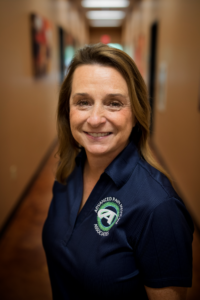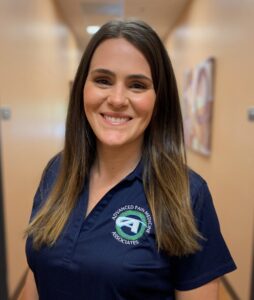
Kim Clothier, PA-C
Kim Clothier holds a Master of Physician Assistant degree from Wichita State University. She also holds a Bachelor’s Degree in Health Service Organization and Policy from Wichita State University. She has received a certification of Physician Assistants (PA-C), as well.
Kim was born in Hays and grew up in the Ozarks near Branson. After high school she returned back to Kansas and attended Fort Hays State University, earning a degree in Radiologic Technology. While working at Wesley Medical Center, the desire to have a more profound impact of peoples health took root and she began advancing her education. Since becoming a Physician’s Assistant, she has worked with a number of doctors who have treated chronic and acute pain. Kim has two daughters and two grandsons, all who reside in Wichita. Her significant other Shawn works for Textron and is an air plane mechanic. Hobbies they enjoy together are bike riding, travel and a good movie.
Kim comes to APMA after spending nearly 6 years at Mid-America Orthopedics, and before that she worked at Wichita Radiological Group for 10 years.
What does “Providing Hope for Pain Sufferers” mean to Kim?
“My greatest goal is to be able to relieve my patients of some of their pain so that they will be able to fully enjoy life.”

Mindy Kobbeman, PA-C
Mindy Kobbeman holds a Master of Physician Assistant degree from Wichita State University. She also holds a Bachelor’s Degree in Kinesiology from Kansas State University. She received a certification of Physician Assistants (PA-C) as well.
Mindy was raised in west Wichita. She attended Andale High School. Mindy and her husband have one toddler daughter and 2 black labs who all keep Mindy and her husband very busy. Mindy’s PA background consists of emergency medicine, family medicine, and hospital medicine. Since becoming a Physician Assistant, Mindy has gained a wide range of experience working with a Medical Providers group for several years.
Mindy comes to APMA after spending 3 years at Minneola District Hospital and 2 years at Lincoln County Hospital. Mindy wanted a job closer to her home to be able to spend more time with her family and be an active team player in her local healthcare system.
What does “Providing Hope for Pain Sufferers” mean to Mindy?
“My goal is to improve the patient’s quality of life by using different modalities available to help with daily chronic pain.”

Megan Poell, APRN
Megan Poell holds a Doctor of Nursing Practice – Adult Gerontology Acute Care Nurse Practitioner from Wichita State University. She also holds a bachelor’s degree in Nursing from Wichita State University and a bachelor’s degree in Biology from Friend’s University. She is board certified by ANCC and has received her Advanced Practice Registered Nurse License.
Megan and her husband have a daughter and two corgis. Her daughter keeps her busy most of the time but when she has free time, she does like to read. Megan was born and grew up in Wichita, Kansas. After obtaining her bachelor’s degree in Nursing from Wichita State University, she worked as a Registered Nurse at Wesley Medical Center. While working as a nurse, she obtained her Doctor of Nursing Practice from Wichita State University. She was a member of Sigma Theta Tau and graduated with honors for post-bachelorette students with Doctor of Nursing Practice that year. Her Doctoral Project & Dissemination education and teaching methods for patients, with a goal to improve patient knowledge and self-monitoring.
Megan comes to APMA after spending the last 3 years providing direct inpatient care at local hospitals as an APRN in Cardiology with both Heartland Cardiology and then later Ascension Cardiology. Prior to that she worked as Cardiac-Telemetry nurse at Wesley Medical Center for more than 8 years.
What does “Providing Hope for Pain Sufferers” mean to Megan? “My goal is to develop a strong patient-provider relationship with the goal of allowing them to enjoy life again. Pain can affect every aspect of a patient’s life. I want to provide the tools and treatments needed for patients to manage their pain. The patient should be in charge of their life, not pain.”
